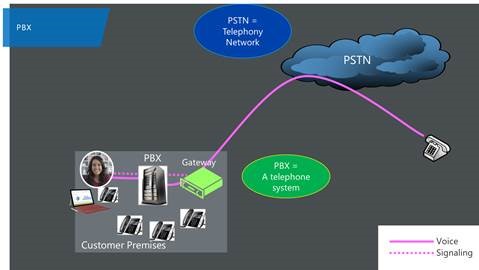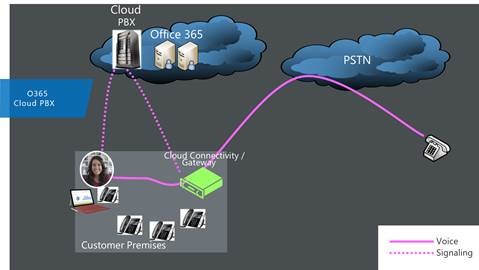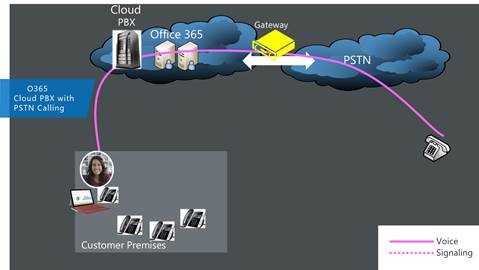Can the concept of Cloud PBX be economically attractive?
Author: Robert-Jan Gerrits & Graham Hosking
Introduction:
Skype for Business Cloud PBX was launched in December 2015 as one of the new O365 Skype for business services . But what does a Cloud PBX actually do and why should organisations have a look at this new PBX concept?
A PBX (private branch exchange) system is the abbreviation for a corporate telephony system. We’ve all used the traditional corporate telephony system which as the same basic principles as your phone system at home, allowing you to make and receive calls from the telephony network as well as make and receive internal calls (calls between two handsets).
 Fig1. Typical PBX freestanding
Fig1. Typical PBX freestanding
Legacy PBX systems can be large pieces of equipment, quite often expensive to maintain due to specialised skills required, especially when the PBX is end-of-life or out-of-support. Because of the high initial cost of most PBXs as well as the approach that when it isn't broken no need to fix it, PBXs are longer term investments ranging from 7 to over 10 years of service.
For a PBX to be to make and receive calls to/from the telephony network, organisations will usually have a contract in place with a Telco or Service Provider to provide a connection between their PBX and the telephony network and provide billing for their calls. As is the case with personal mobile contracts (with a mobile operator), it is most of the times difficult to change or cancel a contract without penalty.
 Fig2. Traditional Call flow from PSTN lines (Outside) to On-Premises
Fig2. Traditional Call flow from PSTN lines (Outside) to On-Premises
Cloud PBX:
The concept of the Cloud PBX is to replace this expensive piece of on-premises equipment with a telephony service equivalent, hosted in the cloud, however this solution can also work with your existing on-premises PBX to bridge the gap between existing investment and future enhancement. Giving you the time and pace to move to the Cloud PBX while maintaining the existing telco/SP connection. The Cloud PBX functionality is invoked through signalling between the on-premises phones and the cloud PBX, while the voice path of the call is established from the on-premises phone through an on-premises Cloud Connector Gateway to the telephone network:
 Fig3. Using existing investments on-premises and leveraging cloud capabilities.
Fig3. Using existing investments on-premises and leveraging cloud capabilities.
Advantages of Cloud PBX:
The advantages of using a Cloud PBX service include:
• Expensive PBX equipment and associated maintenance can be taken as a service from the Cloud
• Existing Telco agreements can leveraged to prevent costly breaches of telco contracts and/or lose hard negotiated attractive call minutes pricing
Cloud PBX with PSTN Calling:
At a later stage, when the organisation's telco/SP contract comes up for renewal, or when the organisation wants to get rid of all on-premises equipment including the on-premises Cloud Connector Gateway, the organisation could decide to move their telco/SP contract to the cloud, ie. O365, as well. This is called using Cloud PBX with PSTN Calling. As before, the Cloud PBX functionality is invoked through signalling between the on-premises phones and the cloud PBX, but in this approach the voice path of the call is established from the on-premises phone through the O365 telephony Gateway to the telephone network:
 Fig4. Cloud PBX in Cloud, connecting to On-Premises
Fig4. Cloud PBX in Cloud, connecting to On-Premises
Advantages of Cloud PBX with PSTN Calling:
The advantages of using a Cloud PBX service with PSTN Calling include:
• Previously mentioned Cloud PBX advantages
• Removal of all on-premises telephony equipment including the on-premises Cloud Connector Gateway
• Single contract for O365 Cloud PBX services as well as telephony Call plans (telco/SP contract)
Conclusion:
The concept of Cloud PBX can deliver economical advantages over on-premises telephone systems (PBX) as outlined above. There are many ways customers can migrate from an on-premises PBX to a cloud PBX so speak to your Microsoft account team or Microsoft voice partner for more information to take you on this journey. Skype for Business is much more than just a telephone system replacement, by expanding the possible options for your staff to connect to the outside world will ultimately also extend your businesses reach. Whether you’re a small business with a handful of staff or a large enterprise, make sure you’re trialing Skype for Business.
Resources:
See Cloud PBX in action: https://blogs.office.com/2015/11/30/a-deeper-view-into-skype-for-business-cloud-pbx/
Simplify your communications: https://blogs.office.com/2016/01/21/cloud-pbx-with-skype-for-business-simplify-communications-in-the-cloud/